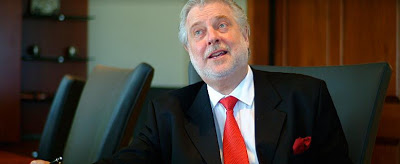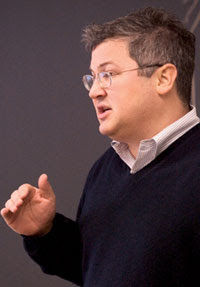Treason

Behold the face of a traitor: David Addington, Chief of Staff to Dick Cheney, who spoke of collaborating with terrorists in an assault on the United States Constitution. He deserves the long, lonely drop to the end of a hangman’s rope* — along with several others we should compel him to name.
“Treason against the United States, shall consist only in levying war against them, or in adhering to their enemies, giving them aid and comfort. No person shall be convicted of treason unless on the testimony of two witnesses to the same overt act, or on confession in open court.”
U.S. Constitution, Article III, Sec. 3.
“We’re one bomb away from getting rid of that obnoxious [FISA] court.” —
David Addington, chief of staff to “vice” President Dick Cheney.
Absent a congressional declaration of war, it is extremely difficult for private citizens to commit acts that meet the statutory and constitutional definition of treason. The same cannot be said of executive branch officials, however — as the statement from David Addington quoted above illustrates.
Clearly, Addington — like lesser figures among the Bushcisti — lusted for a dramatic terrorist attack that would vindicate the administration’s accumulation of dictatorial powers. Unlike such reprobates as Rick Santorum, Dennis Milligan, and Dana Rohrabacher, however, Addington clearly believed that the administration was covertly collaborating with terrorists in an assault on the other constitutionally designated branches of the federal government — the Congress and the judiciary.
How else are reasonable people supposed to interpret Addington’s use of the collective pronoun “we” when referring to a terrorist attack that would upend the balance of power?
This is, simply and unambiguously, treason. Were we still living in a republic, Addington would be arraigned on the charge, assuming that a second witness can be found to his quasi-confession.
Jack Goldsmith, who briefly served as head of the Justice (sic) Department’s Office of Legal Counsel, testifies that Addington made that remark to him in January 2004 during a debate over the merits of Bush’s illegal warrantless wiretapping program. (As conservative legal analyst Bruce Fein points out, by authorizing and carrying out that program, Bush committed numerous federal felonies as well as impeachable offenses.)
As documented in a New York Times Magazine interview, Goldsmith supports the aggrandizement of presidential power. “I’m not a civil libertarian,” he told the Times‘ Jeffrey Rosen, a remark that is difficult to construe as a revelation. He offered no principled objection to the creation of a presidential dictatorship, complete with proto-totalitarian powers of surveillance, detention, and interrogation. But he parted company with his comrades — Addington, Alberto Gonzalez, Jay Bybee, John Yoo, and the others — over matters of “means, not ends,” seeking political support and institutional security by winning congressional support for the revolution. It was his Goldsmith’s belief that a Republican-dominated Congress would enact the administration’s entire program if asked to, and that this “wartime” legislative ratification would protect the new presidential powers from the Supreme Court’s scrutiny.
Goldsmith professes to be alarmed to learn that his comrades were “highly contemptuous of Congress and the courts.” And there was none so expansively contemptuous of the constitutional separation of powers than Addington, who ascribed to the president a nearly messianic status.
In October 2003, Goldsmith, at the request of the White House, examined the terms of the Fourth Geneva Convention to see if they applied to Iraqi civilians accused of “terrorist” attacks on US occupation forces. Reading the text and history of the agreement honestly, Goldsmith concluded that civilian insurgents were covered by the Convention, and reported as much to Gonzalez and Addington.
The latter became “livid” at Goldsmith’s report. “The president has already decided that terrorists do not receive Geneva Convention protections,” proclaimed Addington. “You cannot question his decision.”
As with so many other Bush Regime pronouncements, that statement should be rendered in the original German in order for us to savor its totalitarian tang.
A few months later, Goldsmith again committed the unpardonable sin of questioning a presidential decision, thereby prompting Adddington to warn that a lack of faith in the Grand and Glorious Decider’s omniscience undermines his ability to hold the Evil-Doers at bay: “If you rule that way, the blood of the hundred thousand people who die in the next attack will be on your hands.”
Of course, as Addington admitted on another occasion, the death of innocent Americans would be a good and useful thing, provided that they die ad majorem gloria Bush.

Decorum prevents me from using suitable language to limn the utter depravity of David Addington and people of his ilk. As a key architect of the aggressive war in Iraq, Addington — as well as Cheney, the ambulatory wad of unfiltered evil whose servant he is — could properly be put on trial as a war criminal.
And for cheerfully predicting the death of Americans in the expectation that their innocent blood would baptize a presidential dictatorship, he deserves to be put on trial for treason.
He won’t, of course, because the republic is as dead as the surface of Mars.
Make sure to visit The Right Source and the Liberty Minute archive.
__________________________________________________________
*I hasten to point out that while Addington may be deserving of capital punishment, as an opponent of the death penalty I don’t support inflicting it upon him, should he be found guilty by a jury of his peers — y’know, people like you and me, whose lives he considers disposable. Life imprisonment would be a suitable alternative.
Content retrieved from: http://freedominourtime.blogspot.com/2007/09/treason.html.




